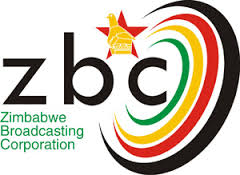Rhodesian Broadcasting Corporation
 |
|
| Type |
Television network Radio network |
|---|---|
| Country | Zimbabwe |
| Availability | National |
| Owner | Government of Zimbabwe |
|
Launch date
|
1963 (as Rhodesian Broadcasting Corporation) |
|
Former names
|
Rhodesian Broadcasting Corporation, and later Zimbabwe Rhodesian Broadcasting Corporation |
|
Official website
|
http://www.zbc.co.zw |
The Zimbabwe Broadcasting Corporation (ZBC) is the state-controlled broadcaster in Zimbabwe. It was established as the Rhodesian Broadcasting Corporation (RBC), taking its current name in 1980. Like the RBC before it, the ZBC has been accused of being a government mouthpiece with no editorial independence.
The ZBC operates six radio networks, providing a mix of news, current affairs, educational programming and music, in English, Shona and Ndebele.
Local radio stations run hourly news bulletins which range from two minutes to the longest being a ten-minute bulletin on weekends and holidays. Presenters include, Admire Mhungu, Innocent Manyenga, Memory Chamisa and Keith Mawoyo.
On the national languages desk readers include Nqobile Malinga, Patience Machokoto, Taboka Ncube, Faith Nare, Lucy Ngosolo and Caroline Sithole.
Bulletins come out live on SFM at 7 am, 8 am, 1 pm, 6 pm and 8 pm and running from Monday to Friday.
The anchors are Nomalanga Vuma, Theophilus Chuma, Ian Zvoma, Butler Nhepure and Jonathan Marerwa.
Television was introduced in Southern Rhodesia on 14 November 1960, first in Salisbury, with transmissions in Bulawayo beginning seven months later. It was only the second such service in sub-Saharan Africa after Nigeria, and the first such service in southern Africa, as South Africa did not introduce television until 1976. It was initially operated by a private company, Rhodesian Television (RTV) on behalf of the then Federal Broadcasting Corporation, the Central African Federation's state broadcaster. RTV's major shareholders were South African companies, including the Argus Group of newspapers, parent company of the Rhodesia Herald, and Davenport and Meyer, the latter of which operated LM Radio, based in Mozambique, then under Portuguese rule. However, following the dissolution of the Federation in 1963, RTV was taken over by the government. The RBC initially acquired a 51 per cent stake in the service, which became part of the RBC in 1976. RBC TV was funded by advertising and a television licence fee. Television reception was confined mainly to the large cities, and most viewers were whites.
...
Wikipedia
